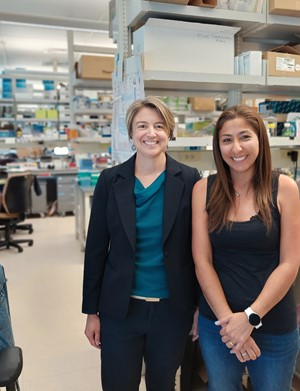Technique-Sharing Grants
The 2024 application cycle is now open! SMI is assisting researchers by supporting travel grants to learn techniques from their fellow mucosal immunologists.
This program is eligible to members of SMI. Only travel trainees can fill out the application, and a letter of support provided by the principal investigator is required. Priority will be given to applications in which both the visiting scientist and host are active SMI members.
About the Technique-Sharing Grant
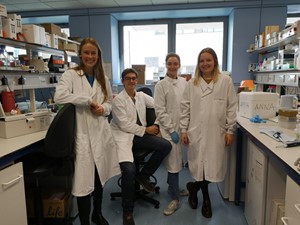
This grant’s objective is to help researchers within SMI learn from their peers by supporting travel grants to learn techniques from other mucosal immunologists. Not only will the program benefit researchers directly, it will also strengthen connections between members and the integrity of the society.
Eligibility
This program is eligible to members of SMI. Only travel trainees can fill out the application, and a letter of support provided by the principal investigator is required. Priority will be given to applications in which both the visiting scientist and host are active SMI members.
Application Requirements
The following are required components of the application: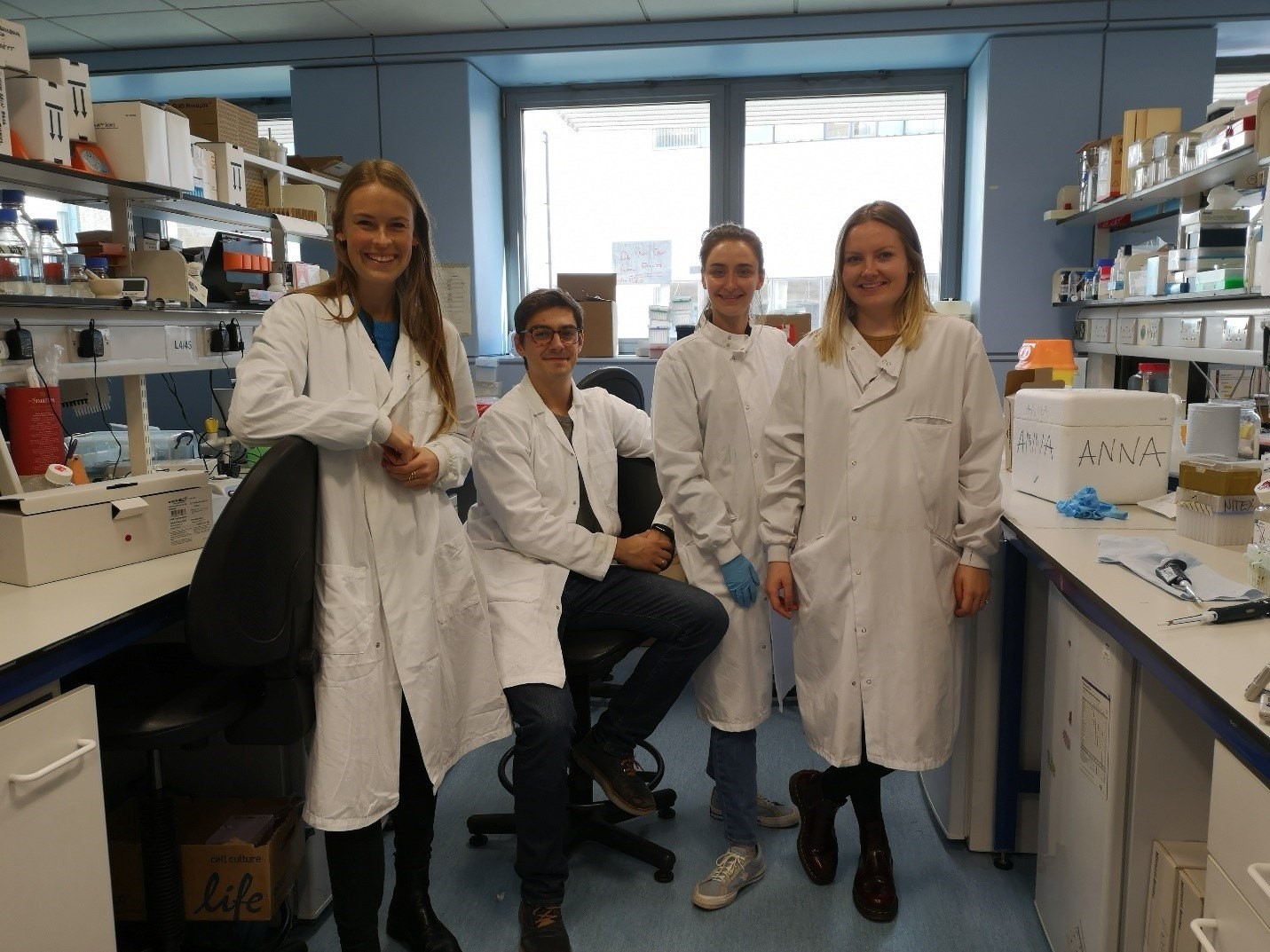
- A description of the travel plans, including a short overview of the project, a description of the technique to be learned, and how it will help the project (maximum length: 1-page)
- CV of the person to travel
- Statement of consent from the hosting researcher
- Letter of support from the principal investigator in case of direct application by the trainee
- Preliminary budget and explanation of budget ($1,500 is the maximum amount, with exceptions)
2024 Submission Deadlines
There will be four submission windows, each closing on the dates listed below. Application materials should be submitted before the closing date. Notifications will be sent within 4 weeks of the submission closing date.
- Thursday, February 29th
- Friday, May 31st
- Friday, August 30th
- Friday, November 29th
Award Recipient Requirements
Travels should be concluded within twelve (12) months of award notice. Reimbursement of travels will be performed after submission of travel expense details according to the amount stated in the approval, and in accordance with SMI reimbursement policies.
Award Recipients
- 2023
- February
- Claire Adams
- Brianna Jesaveluk
- Anissa Zouzaf
- May
- David Bejarano
- Rhiannon Grant
- Maria Belen Polo
- Carolina Prado
- Eva-Lena Stange
- February
- 2022
- May
- Laura Cook
- Naomi Daniels
- August
- Elisa Cruz-Morales
- Luciana Moine
- November
- Vanessa Angelova
- Sarah Danielson
- Rahul Ravindran
- Emanuel Barbiera Romero
- May
Carolina Prado's - 2023 Technique-Sharing Grant Story
"My research is focused on how bacterial metabolites impact the gut immune system and their influence on central nervous system autoimmune diseases. In 2023, supported by the SMI Technique-Sharing Travel Grant, I had the opportunity to receive training in Dr. Kristine Kuhn's Lab at the University of Colorado Anschutz Medical Campus, USA. During my visit, I learned to use a trafficking system to evaluate migration from the intestine to extra-intestinal sites developed by Kuhn's lab (Lefferts et al. Frontiers in Immunology 2022). The system relies on the use of a photoconvertible transgenic KikGR mice which express a green fluorescent protein that will convert to a red emission following exposure to 405 nm light. Specifically, I was trained to perform colonoscopy with photoconversion, which includes care of the animal and tissue, identification of cellular trafficking using flow cytometry, and troubleshooting in real time. I am truly grateful to SMI for funding this training and to Dr. Kuhn for all her support provided during this experience."
Sarah Danielson's - 2023 Technique-Sharing Grant Story
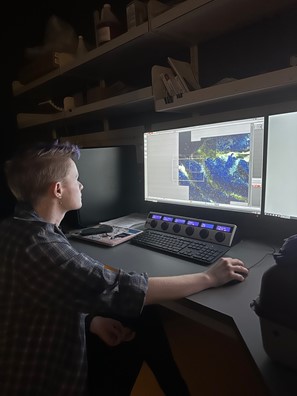
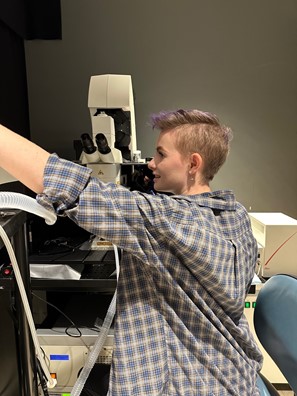
"Travel for techniques gave me the opportunity to collaborate with and learn a unique and useful technique from an expert in the field."
Naomi Daniels' - 2023 Technique-Sharing Grant Story
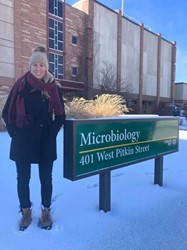
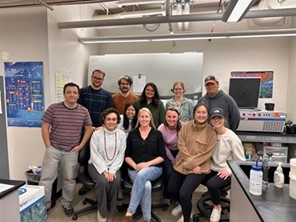
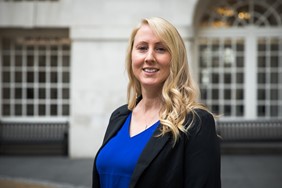
My current research investigates how hypervirulent strains of Mycobacterium tuberculosis (Mtb) are able to escape protective immunity afforded by the bacillus Calmette-Guérin (BCG) vaccine. I recently developed fluorescent clinical strains of Mtb by transformation of patient specimens, providing an invaluable visualisation tool for investigating the lung immune response to different strains of Mtb.
In the first half of 2023, I carried out a 5-month technique-sharing visit to the Henao-Tamayo lab at Colorado State University (CSU), USA, supported by an SMI technique-sharing grant. During this time, I learnt aspects of in vivo experimentation and analysis within their Biosafety Level (BSL)3 facility. Specifically, I was able to utilise models of aerosolised Mtb infection and carry out multiparameter spectral flow cytometry on cells from fluorescent Mtb-infected lungs.
Employing in vivo BSL3 experimental techniques and spectral flow cytometry at CSU, I was able to evaluate early innate immune responses in the lung, comparing infection with either hypervirulent or conventional strains of Mtb after BCG vaccination. High dimensional analyses of these experiments is currently underway, which will undoubtedly provide fascinating insights into how hypervirulent Mtb may be escaping from vaccine-mediated immunity.
I am immensely thankful to SMI for providing funding to support this lab exchange, which will significantly enhance the impact of publishable works from this project, as well as providing upskilling to greatly strengthen my capability for developing into a successful independent researcher.
Laraib Amir Ali’s - 2023 Technique-Sharing Grant Story
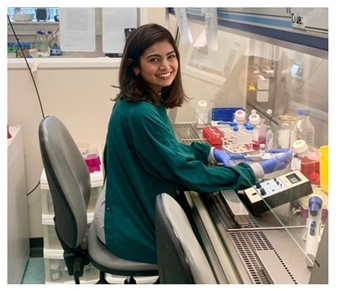 Through funding from a Technique-Sharing Grant from the Society for Mucosal Immunology to my supervisor Dr. Laura Cook, I had the opportunity to receive training in Prof. Roslyn Kemp's Lab at the University of Otago in Dunedin, New Zealand. In two productive weeks, I learned various experimental techniques, including establishing 3D intestinal organoids from human intestinal biopsies, growing 2D monolayers derived from the 3D organoids on transwell inserts, measurement of Transepithelial Electrical Resistance using a voltohmeter and immunofluorescence staining of monolayers. I also got the opportunity to present my project at the Kemp group lab meeting and get helpful feedback. I also attended several seminars on the immunology research being conducted at the University of Otago and the opportunity to expand my professional network was invaluable. I am now establishing organoid-derived monolayers in Dr. Cook’s lab at the University of Melbourne in the Peter Doherty Institute for Infection and Immunity.
Through funding from a Technique-Sharing Grant from the Society for Mucosal Immunology to my supervisor Dr. Laura Cook, I had the opportunity to receive training in Prof. Roslyn Kemp's Lab at the University of Otago in Dunedin, New Zealand. In two productive weeks, I learned various experimental techniques, including establishing 3D intestinal organoids from human intestinal biopsies, growing 2D monolayers derived from the 3D organoids on transwell inserts, measurement of Transepithelial Electrical Resistance using a voltohmeter and immunofluorescence staining of monolayers. I also got the opportunity to present my project at the Kemp group lab meeting and get helpful feedback. I also attended several seminars on the immunology research being conducted at the University of Otago and the opportunity to expand my professional network was invaluable. I am now establishing organoid-derived monolayers in Dr. Cook’s lab at the University of Melbourne in the Peter Doherty Institute for Infection and Immunity.
I had an enjoyable and memorable experience, and I am extremely grateful to Prof. Roslyn Kemp for welcoming me to her lab, her PhD student Ms. Gemma Laws for training me, my supervisor Dr. Laura Cook for arranging the trip and to SMI for the funding. I am excited to use these new techniques in our Mucosal Immunology research.
Elisa Cruz Morales' - 2023 Technique-Sharing Grant Story
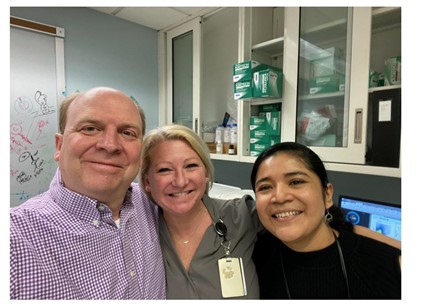 During my postdoctoral appointment in Dr. Terri Laufer’s Laboratory at the University of Pennsylvania, I have been evaluating the requirements of MHCII and costimulatory signals for the maintenance of regulatory T cells in the intestinal niche. This work has led to our interest in studying the regionalization of immune cells in the intestinal niche, especially in analyzing isolated lymphoid follicles (ILFs). However, to move forward this branch of the project we had technical difficulties when trying to dissect ILFs. Dr. Rodney Newberry, of Washington University in St. Louis, is an expert in the field of intestinal immunology and in particular of ILFs biology. He has developed a unique technique to dissect exclusively these intestinal structures. Thankfully, Dr. Newberry kindly accepted my request for visiting his laboratory to learn this technically challenging procedure. I decided to submit my application for the Technique-Sharing Grants offered by the SMI because our very small laboratory did not have funding to support my trip.
During my postdoctoral appointment in Dr. Terri Laufer’s Laboratory at the University of Pennsylvania, I have been evaluating the requirements of MHCII and costimulatory signals for the maintenance of regulatory T cells in the intestinal niche. This work has led to our interest in studying the regionalization of immune cells in the intestinal niche, especially in analyzing isolated lymphoid follicles (ILFs). However, to move forward this branch of the project we had technical difficulties when trying to dissect ILFs. Dr. Rodney Newberry, of Washington University in St. Louis, is an expert in the field of intestinal immunology and in particular of ILFs biology. He has developed a unique technique to dissect exclusively these intestinal structures. Thankfully, Dr. Newberry kindly accepted my request for visiting his laboratory to learn this technically challenging procedure. I decided to submit my application for the Technique-Sharing Grants offered by the SMI because our very small laboratory did not have funding to support my trip.
I am immensely grateful to Dr. Newberry and the SMI for giving me this invaluable opportunity! Under Dr. Newberry mentorship I had not only the chance to learn new sophisticated techniques; but most importantly, it exposed me to the cutting-edge research that is done in his laboratory. The thoughtful discussions with his team allowed me to extend my understanding on mucosal immunology, to enrich my research ideas and gave me the opportunity to expand my professional network.
I really enjoyed meeting Dr. Newberry’s team! They always made me feel welcomed and part of them. I would like to add a special thanks to Keely MacDonald for taking me under her wing, for the time she invested in my training and all her invaluable advice.
This mentorship is already having a positive impact in my research project. I am confident that it will promote my professional growth. The Technique-Sharing Grant has helped me to establish new connections with other scientists that share my passion about mucosal immunology, and to set a base for other fruitful collaborations in the future.
I look forward to sharing my new research findings, products of this visit, in the next ICMI!
Sincerely,
Elisa Cruz-Morales
Postdoctoral Fellow at Terri Laufer Laboratory
University of Pennsylvania


